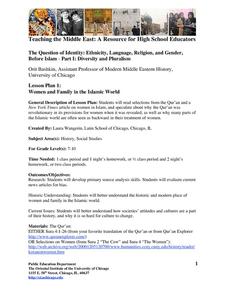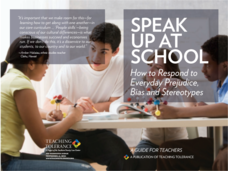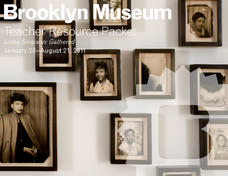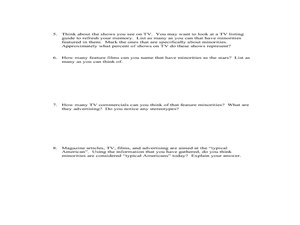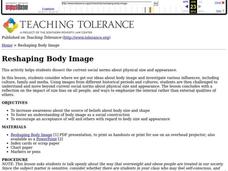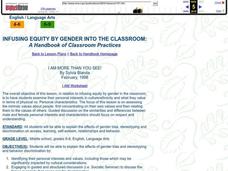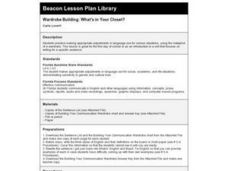Anti-Defamation League
Should Washington's NFL Team Change Their Name?
"What's in a name?" Is it irrelevant, as Juliet suggests in Shakespeare's play, or is nomenclature deeply significant? Young scholars weigh in on the debate by examining the controversy over the NFL's Washington, D.C. Redskins. Groups...
Curated OER
Social Psychology
Sparknotes provides Psychology Study Guides and this 5-question review of the material addresses individualist and collectivist culture, obedience, and more.
University of Chicago
Women and Family in the Islamic World
How does the Qur'an detail the role of women? What modern social issues are linked to Islamic law? Address these questions with your young historians through close analysis of primary and secondary source documents.
Middle Tennessee State University
John Brown: Hero or Villain?
"Love it or leave it." "You're either for us or against us." Rhetoric and it's polarizing effects are the focus of a lesson that uses John Brown's attack on Harper's Ferry as an exemplar. Groups examine primary source documents,...
Southern Poverty Law Center
Speak Up at School
When someone says something offensive based on prejudice or a stereotype, it's often difficult to know how to react. A packet on tolerance and standing up for others guides teachers to both learn and instruct members of their class to...
Curated OER
Investigating Respect
Students examine prejudice and stereotyping. In this prejudice and stereotyping lesson, students define the words and give examples. They look at pictures of five different people before working in groups to discover their own prejudices...
Curated OER
INFUSING EQUITY BY GENDER INTO THE CLASSROOM:A Handbook of Classroom Practices
Students examine how gender bias, stereotyping, and discrimination impacts their lives. Students examine behaviors they believe are acceptable for males and females and will compose an essay based on their findings.
Curated OER
Asian Cinderella Tales
Explore the world of fairy tales using this instructional activity focusing on higher- order thinking skills. Learners compare and contrast an Asian Cinderella story to other versions. It is a great way to review the characteristics of...
Curated OER
News Journalism Across the Media: Introduction
Although students are aware of news as information that influences their perceptions of the world, they are often unaware of the various ways to present that information. Encourage them to investigate, discuss, analyze and make valuable...
Curated OER
All's Fair in Sport And Competition
Students design a physical activity contest or game that has no cultural or gender biases which includes an assessment that ranks competitors according to the competitors abilities. They participate in and evaluate the newly designed...
Brooklyn Museum
Lorna Simpson: Gathered
Lorna Simpson is a photographer who has put together a collection of photos from the 1950s in order to challenge the idea that primary source documents are objective in their portrayal of history. Learners are introduced to Ms. Simpson's...
Curated OER
Communication Skills
Young scholars practice and model good listening skills, become aware of the effects of cultural and other biases that affect communication.
Curated OER
I Am More Than You See
Students examine their personal interests in culture/ethnicity and what they value in terms of physical vs. Personal characteristics. They discuss the forces in society that cause gender discrimination.
Curated OER
Pre-Columbian Native Peoples and Technology
Students explore Pre-Columbian native cultures. In this Exploration Era lesson, students define the words "primitive," "civilized," and "technology." Students consider the connotations of the words and then investigate misconceptions...
Curated OER
Minorities in Mainstream American Society
So many people fought for Civil Rights in the United States. Read about the Civil Rights Act of 1964, and discuss what the act guarantees. Then pass out a slew of magazines and encourage them to observe how often minorities appear in...
Curated OER
Reshaping Body Image
Students view images and write responses based on their impressions. In this body image lesson, students brainstorm how body image is influenced culturally and participate in a small group discussion on these influences. Students view...
Curated OER
COMING TO AMERICA: THE NEW IMMIGRANTS
Students become involved in the process of interpreting history by looking at primary source documents. This promotes critical thinking skills and comprehension of concepts and their relationships to different time periods through...
Curated OER
Jose' Clemente Orozco
Students analyze the art of Mexican artist Jose' Clemente Orozco and complete analysis activities. In this Mexican art analysis lesson, students read about Orozco's Zapatistas and answer discussion questions.
Curated OER
The Study of the Spanish-Speaking People of Texas: Who is Russell Lee?
Students investigate the contributions of the photojournalist Russell Lee. They read a biography of Russell Lee, and create a timeline of Lee's life.
Curated OER
I Am More Than You See
Young scholars discuss the effects of gender bias and stereotyping by identifying personal interests and values. In this sociology lesson plan, students iscuss the forces in society which cause gender discrimination, create poems about...
PBS
The Sixties: Notes from the Ho Chi Minh Trail
Young historians research the rationales for fighting the Vietnam War, and the controversies surrounding it. They watch film clips, examine photographs, and read Lyndon B. Johnson's message to Congress to gather information for a...
Curated OER
Without Limits
Seventh graders research about the important contributions of two scientists they chose from the list. In this science lesson, 7th graders develop a creative presentation such as skits or news program about their research. They present...
Curated OER
Wardrobe Building: What's in Your Closet?
Fourth graders rewrite a sentence using a different style of English each time.
Curated OER
EMOTIONS AND GENDER EQUITY
Students discuss emotions and decide as a group which emotions are O.K. for males/females. They discuss solutions to gender bias in terms of the different emotions and write a reflective essay about what they learn from the discussion.




